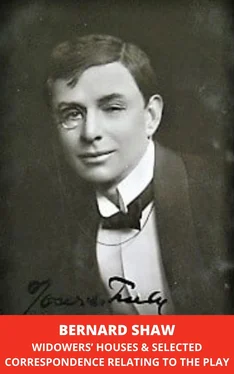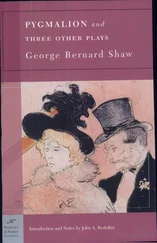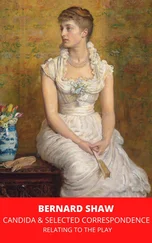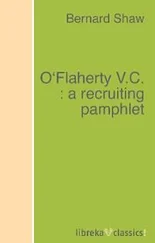As to the highly connected young gentleman, naturally straightforward and easygoing, who bursts into genuine indignation at the sufferings of the poor, and, on being shewn that he cannot help them, becomes honestly cynical and throws off all responsibility whatever, that is nothing but the reality of the everyday process known as disillusion. His allowing the two business men to get his legs under their mahogany, and to persuade him to “stand in” with a speculation of which he understands nothing except that he is promised some money out of it, will surprise no one who knows the City and has seen the exploitation of aristocratic names by City promoters spread from needy guinea-pig colonels, and lords with courtesy titles, to eldest sons of the noblest families. If I had even represented Harry Trench as letting himself in for eighteen months hard labor for no greater crime than that of being gambler enough to be the too willing dupe of a swindler, the incident would be perfectly true to life. As to the compensation speculation in the third act being a fraud which no gentleman would have countenanced, that opinion is too innocent to be discussed. I can only say that as the object of the scheme is to make a haul at the expense of the ratepayers collectively, it is much less cruel and treacherous in its incidence than the sort of speculation which made the late Mr Jay Gould universally respected during his lifetime. I shall be told next that the Prince of Wales is not a gentleman because he plays baccarat; that copper cornerers like Mr [Pierre-Eugène] Secrétan, and cotton cornerers like Mr [William] Steenstrand, are not admited into society; that Pearson’s Weekly had no reputable subscribers; and that Panama [Canal] is a dream of mine.
There is a curious idea in the minds of some of my critics that I have given away my case by representing the poor man, Lickcheese, as behaving exactly as the rich man does when he gets the chance. These gentle-men believe that, according to me, what is wrong with society is that the rich, who are all wicked, oppress the poor, who are all virtuous. I will not waste the space of The Star by dealing with such a misconception further than to curtly but goodhumoredly inform those who entertain it that they are fools. I administer the remark, not as an insult, but as a tonic.
Most of the criticisms of my heroine, Blanche Sartorius, are summed up in the remark of the servant whom she throttles: “You ought to be ashamed of yourself, Miss Blanche, so you ought.” I admit that she ought not to have vented her rage on the servant; but it must be remembered in extenuation that she had no sister. On another point in her conduct one critic makes an objection which, I confess, amazed me. Sartorius, as the son of a very poor woman, knows that the poor are human beings exactly like himself. But his daughter, brought up as a lady, conceives them as a different and inferior species. “I hate the poor” she says. “At least, I hate those dirty, drunken, disreputable people who live like pigs.” The critic in question, whose bias towards myself is altogether friendly, cannot conceive that a young lady would avow such inhuman sentiments: hypocrisy, he contends, would prevent her if her heart did not. I can only refer him, if he has really never heard such sentiments boasted of by ladies, to the comments of The Times and the St James’s Gazette (to name no other papers written by gentlemen for gentlemen) on the unemployed, on the starving Irish peasants whose rents have since been reduced wholesale in the Irish land courts, or on the most heavily sweated classes of workers whose miserable plight has been exposed before the Housing of the Poor and Sweating Commissions, to prove that the thinkers and writers of Blanche Sartorius’s party vie with each other in unconscious—nay, conscientious—brutality, callousness, and class prejudice when they speak of the proletariat. Hypocrisy with them takes the shape of dissembling sympathy with the working class when they really feel it, not of affecting it when they do not feel it. My friend and critic must remember the savage caricatures of William Morris, John [Elliot] Burns, Miss Helen Taylor, Mrs [Annie] Besant, &c., in which [a British weekly magazine of humour and satire] Punch once indulged, as well as the outrageous calumnies which were heaped on the late Mr [Charles] Bralaugh during his struggle to enter Parliament, and the remonstrance of The Saturday Review with the Government for not hanging myself, Mr Sidney Webb, and other London reformers in 1885-7, not to mention the cases of unsocial conduct by county gentlemen and magistrates that are exposed every week in the “Pillory” columns of Truth . Am I to be told that the young ladies who read these papers in our suburban villas are less narrow and better able to see across the frontiers of their own class than the writers whom they support? The fact is that Blanche’s class prejudices, like those of the other characters in the play, are watered down instead of exaggerated. The whole truth is too monstrous to be told otherwise than by degrees.
Now comes the question, How far does all this touch the merits of the play as a work of art? Obviously not at all; but it has most decidedly touched the value of the opinions of my critics on that point. The evidence of the notices (I have sheaves of them before me) is irresistible. With hardly an exception the men who find my sociology wrong are also the men who find my dramatic workmanship bad; and vice versa. Even the criticism of the acting is biased in the same way. The effect on me, of course, is to reassure me completely as to my own competence as a playwright. The very success with which I have brought all the Philistines and sentimental idealists down on me proves the velocity and penetration with which my realism got across the footlights. I am well accustomed to judge the execution I have done by the cries of the wounded.
On one point, however, I heartily thank my critics for their unanimous forbearance. Not one of them has betrayed the absurdities and impossibilities which abound in the political and commercial details of the play. They have even declared that here I am on my own ground, and that here consequently I rise, competent and entertaining, above criticism. Considering that I have made a resident in Surbiton eligible as a St Giles vestry-man; that I have made the London County Council contemporary with the House of Lords Commission on the Housing of the Working Class; that I have represented an experienced man of business as paying seven percent on a first mortgage; that I have finished up with an unprecedented and farfetched mortgage transaction which will not stand criticism by any expert from the City: considering, in short, that I have recklessly sacrificed realism to dramatic effect in the machinery of the play, I feel, as may be well imagined, deeply moved by the compliments which have been paid me on my perfect knowledge of economics and business. Thanks, brothers, thanks.
In conclusion, let me say that whilst I shall not affect to attribute the difference between myself and most of my critics to anything else but the pretty plain fact that I know my subject much better than they do, I claim no much more for the play than that it has served its turn: better, perhaps, than a better play. My point of view is being reached by larger and larger masses of the people; and when it has become quite common, everybody will see a good many more faults in Widowers’ Houses than have been yet discovered by anyone except yours truly
G. Bernard Shaw
35/ Bernard Shaw’s diary entry for 22nd December 1892
(at Kelmscott [House])
Set to work making an album of all the press notices of the play [ Widowers’ Houses ]. Cold weather, very muddy underfoot. [Henry Halliday] Sparling and I went for a walk before dinner. The routine here is that Sparling and I work all day in the green room, the others visiting us occasionally, but using the tapestry room. Breakfast at 9; dinner at 13; afternoon tea at about 17; and supper at 19. Then we all go up to the tapestry room and play at “20 Questions.” All except Morris and myself go to bed at about 22 or 23. We sit up and jaw a bit longer. Tonight [William] Morris talked a lot about Iceland. This evening we had the mummers in.
Читать дальше












